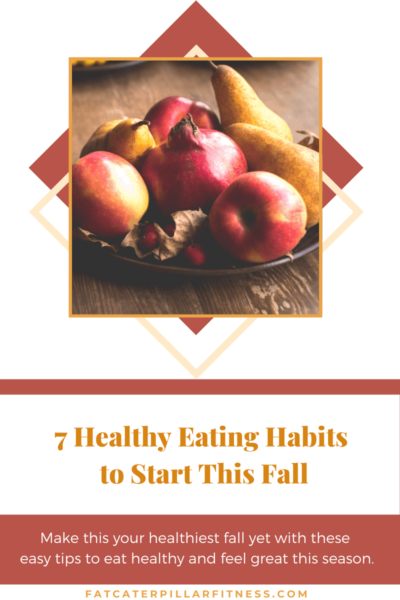The fall season is upon us, and I’m excited about everything this season of abundance brings — things like beautiful leaf changes, pleasant cooler weather, apple & pumpkin picking, and corn mazes. Autumn also brings lots of amazing food to eat, and if you’re not careful, extra calories. Which is why it’s the perfect time to share with you my healthy eating habits you can start this fall!
With the fall comes seasonal fruits and vegetables, such as pumpkins, squash, apples, and pears. It also brings comfort foods like pies, soups, roasts, and casseroles. But along with all the yummy food can come lots of extra calories.
So, how do you still enjoy the wonderful foods of the season without putting on the pounds? These healthy eating tips can help you feel your best through the new season.
Why We Eat More in Fall
We could blame our fall weight gain on the holidays, but it goes deeper than that. One reason we eat more could be that our ancestors did the same. Fall is a harvest season, which means that food is all around us. So, when we have more food, we tend to eat more.
Another belief is that we can eat more because we can hide our excess calories underneath all our cute sweaters and winter coats. Whatever it might be, there is always a risk of gaining extra weight during the fall. But it is possible to embrace the fall season and eat healthy at the same time.
Here are my tips to keep you on track:
Tips for Eating Healthy in Fall
Fall foods can be very rich in nutrients. By stocking up on seasonal foods like butternut squash, apples, sweet potatoes, pumpkins, healthy soups, and all types of vegetables, you can find plenty of delicious and healthy options. These seven simple tips will show you how to keep the fall season flavorful and healthy at the same time.
- Prepare Food Before Mealtime
To avoid overeating, prepare your food before hunger kicks in. Store your leftovers in the fridge for future meals. Stock the fridge with fall fruits and vegetables like apples, pears, grapes, and carrots, that are perfect for healthy snacking. Keeping yummy nutritious food around helps you resist the urge to reach for junk food.
- Eat Small Portions
Eat three meals a day and fit in two snacks between them. Try only to eat until you feel satisfied but not full. Consuming more than what you need can make you feel bloated and uncomfortable. You want to be eating enough throughout the day to keep the hunger away, and smaller portions can be an ideal solution.
- Eat More Fiber
Studies show that adults need a minimum of 25 grams of fiber daily. Eating enough fiber can reduce cholesterol build-up in the body. It can also lessen the occurrence of obesity, diabetes, and heart disease.
Fruits, vegetables, and whole grains are all fantastic sources of fiber. By eating more fiber, you’ll feel satisfied longer with fewer calories.
- Cut Back on Sugar
Sugary foods like soft drinks, doughnuts, pastries, cookies, and chocolate have much higher calorie contents. Eating these foods a lot can give you many unnecessary calories. That doesn’t mean you can’t indulge in a dessert here and there, but limiting your sugar will make you feel a lot healthier.
- Go for Lean Meat and Protein
Lean meats are a great source of protein, with fewer calories than fattier meats. Skinless chicken and lower-fat red meat, like beef and pork, are great examples of lean meats. As for vegetarian proteins, try eating eggs, nuts, beans, and lentils.
- Swap Dessert for Fruit
Desserts are great post-meal treats, no doubt. But they can hold a lot of processed sugar, which not only has lots of calories, but can also make you not feel your best. Fruit can cater to your sweet tooth, while also giving you lots of nutrients to fuel your body.
If you’re craving something sweet after your meals, help yourself to a small serving of fruit. For a fancier treat, try apple or pear slices topped with cinnamon and chopped walnuts. Warm the mixture in the microwave for 30 seconds and you’ve got yourself a super easy, sweet yet healthy dessert.
- Don’t Overlook Dairy
Dairy is a fabulously easy way to get a very high dose of essential vitamins and minerals. They’re rich in nutrients like protein, calcium, Vitamin D, and potassium, which are great for bone health.
Dairy foods such as milk, yogurts, and cheeses also carry lots of healthy fats, which are essential for your diet. These healthy fats in dairy will help you feel satisfied for long periods, and even reduce your risk of heart disease.
The Bottom Line
As you enjoy the bountiful foods the fall season brings, you should still be mindful of how you eat so that you don’t pack on unwanted pounds. These healthy eating tips are a few of the small things you can do so you keep you feeling healthy and fit this Autumn season.
What are some healthy things you’re going to do during fall? Let me know in the comments below!




